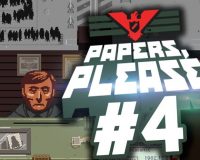

It's also a thought-provoking glimpse into the lives of those struggling against the oppressive governments of developing nations.


Settling into a steady rhythm of accurate document processing may sound boring as hell, but Papers, Please makes it stimulating. Organization, efficiency, and focus are paramount for survival. The top three most-most wanted criminal mug shots go towards the right, so their faces line up with passport photos. I carefully set up my desk each day the rule book goes in the upper left, where I can flip between pages to make sure the issuing city listed on passports is genuine.

You meticulously cross-check information on passports, work visas, immunization records, ID cards, diplomatic immunity papers, and a host of other superfluous rigmarole. Your daily job is made up of smaller victories and defeats. I winced at the sound of the printer coughing out another citation, and beamed when awarded a plaque for sufficience. The added pressure of caring for your family adds significance to every inspection. Accumulate a pile of citations and spend evenings choosing between paying for food, heat, or medicine. Approving too many people with false documentation, or denying too many people with proper papers, results in fines that are deducted from your meager salary. Pay is determined by how many would-be travelers you process correctly. Players assume the role of a checkpoint guard assessing travelers' documents as they attempt to cross borders between socialist (and fictitious) European countries. Most gamers have no idea what it may be like to uphold a nation's strict immigration policies, but I feel like I have an inkling having played indie developer Lucas Pope's eccentric and engrossing Papers, Please. National security is a touchy subject, especially considering the lines some countries walk between privacy and protection.


 0 kommentar(er)
0 kommentar(er)
